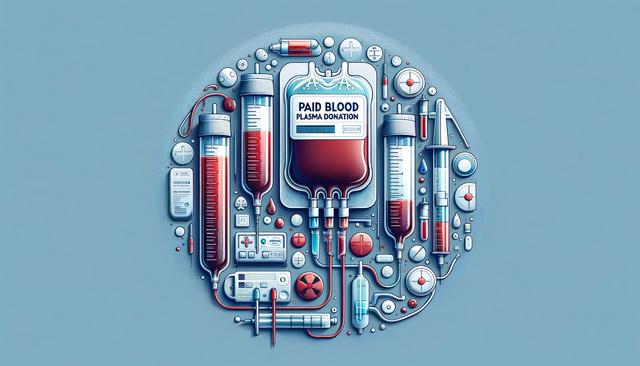What Is Blood Plasma and Why Is It Important?
Blood plasma is the yellowish fluid component of blood that carries cells and proteins throughout the body. It plays a crucial role in various medical treatments, including therapies for immune deficiencies, bleeding disorders, and certain neurological conditions. Plasma contains antibodies, clotting factors, and other essential proteins that cannot be synthetically manufactured, making donations vital for patients in need.
Unlike whole blood donations, which usually occur every few months, plasma can be donated more frequently—often up to twice a week. This is because the body replenishes plasma more quickly than red blood cells. The donated plasma is used to create life-saving medications, such as immunoglobulins and clotting factor concentrates, which are essential for managing chronic and rare diseases.
How Paid Plasma Donation Works
Paid plasma donation typically takes place at specialized donation centers. The process involves a method called plasmapheresis, where blood is drawn from the donor, the plasma is separated, and the remaining blood components are returned to the donor’s body. This procedure usually takes about 60 to 90 minutes and is performed under the supervision of trained medical staff.
Donors are compensated for their time and effort, which makes this form of donation appealing to many people, especially those looking for flexible ways to earn additional income. The exact amount of compensation varies by location and donation frequency. To ensure safety, donors must meet specific eligibility criteria, including:
- Being in good general health
- Meeting age and weight requirements (typically 18-65 years old and over 110 pounds)
- Passing a comprehensive health screening
- Providing valid identification and proof of address
Centers also conduct regular blood tests to monitor protein levels and overall health, ensuring that frequent donations do not negatively impact the donor’s well-being.
Health and Safety Considerations
Safety is a top priority in the paid plasma donation process. Clinics follow strict guidelines set by health authorities to protect donors and recipients alike. Every donation session uses sterile, single-use equipment to eliminate the risk of infections. Additionally, the initial and ongoing health screenings help identify any potential health risks for the donor or the recipient of the plasma-derived treatments.
While the procedure is generally well-tolerated, some donors may experience mild side effects such as dizziness, fatigue, or bruising at the needle site. Staying hydrated, consuming a healthy meal before the appointment, and avoiding strenuous activities afterward can help minimize these effects. Long-term health impacts are rare, especially when donors adhere to recommended donation frequencies and follow medical advice.
It’s also important to note that not everyone is eligible to donate plasma. Conditions like anemia, certain chronic illnesses, or recent travel to areas with endemic diseases may temporarily or permanently defer someone from donating. This ensures that the plasma collected is safe and suitable for medical use.
Benefits of Donating Plasma
Paid plasma donation offers benefits to both donors and recipients. For donors, the financial compensation provides an incentive, making it a viable option for supplementing income. Beyond monetary gain, many donors find satisfaction in knowing they are contributing to critical medical therapies that improve or even save lives.
Recipients of plasma-derived treatments may include individuals with:
- Primary immunodeficiency disorders
- Hemophilia and other bleeding disorders
- Autoimmune diseases
- Severe burns or trauma injuries
The demand for plasma is constant, as these treatments are ongoing and often lifelong. By donating plasma, individuals help maintain a stable supply of these essential therapies. Additionally, many centers offer incentives for consistent donations, such as loyalty bonuses or referral programs, which can further enhance the donor experience.
Aside from the personal and financial benefits, regular plasma donations can also foster a sense of community among donors, encouraging a culture of giving and health awareness.
Things to Consider Before Donating
Before deciding to donate plasma for compensation, it’s important to weigh a few key considerations. While the process is generally safe, donors should be aware of the time commitment involved and the need for consistent health monitoring. Maintaining a healthy lifestyle is essential to ensure eligibility and to support the body’s ability to recover between donations.
Potential donors should also research local donation centers, comparing factors such as:
- Compensation rates and payment methods
- Cleanliness and professionalism of the facility
- Donor reviews and reputation of the center
- Availability of appointments and schedule flexibility
Moreover, transparency from the center regarding how the plasma will be used can help donors feel more connected to the cause. Some centers provide updates on how donations contribute to specific therapies or patient groups, which can enhance the overall donation experience.
Finally, understanding the legal and ethical aspects of paid plasma donation is important. Regulations may vary by country or region, and donors should ensure that the center operates within approved medical guidelines to safeguard their health and the integrity of the donation process.
Conclusion: Making an Informed Choice
Paid blood plasma donation is a unique opportunity to support public health while receiving compensation for your time. It combines financial benefit with social impact, making it an appealing option for many individuals. However, it’s important to approach it with careful consideration, awareness of the health requirements, and a commitment to safety. For those who qualify and are willing to contribute regularly, plasma donation can be a rewarding way to make a tangible difference in the lives of others.




Leave a Reply